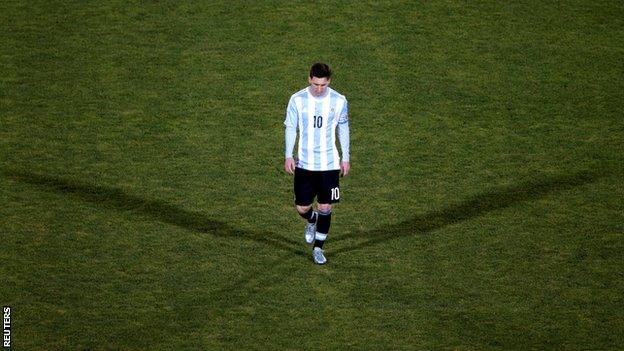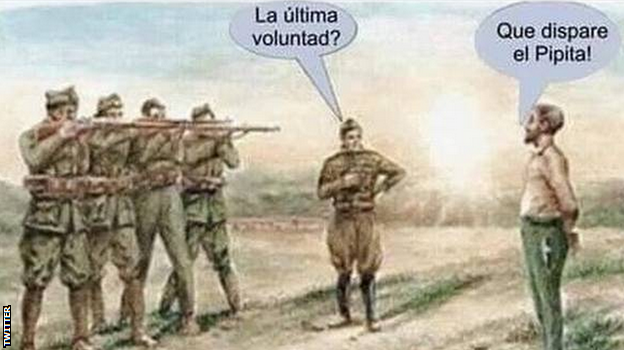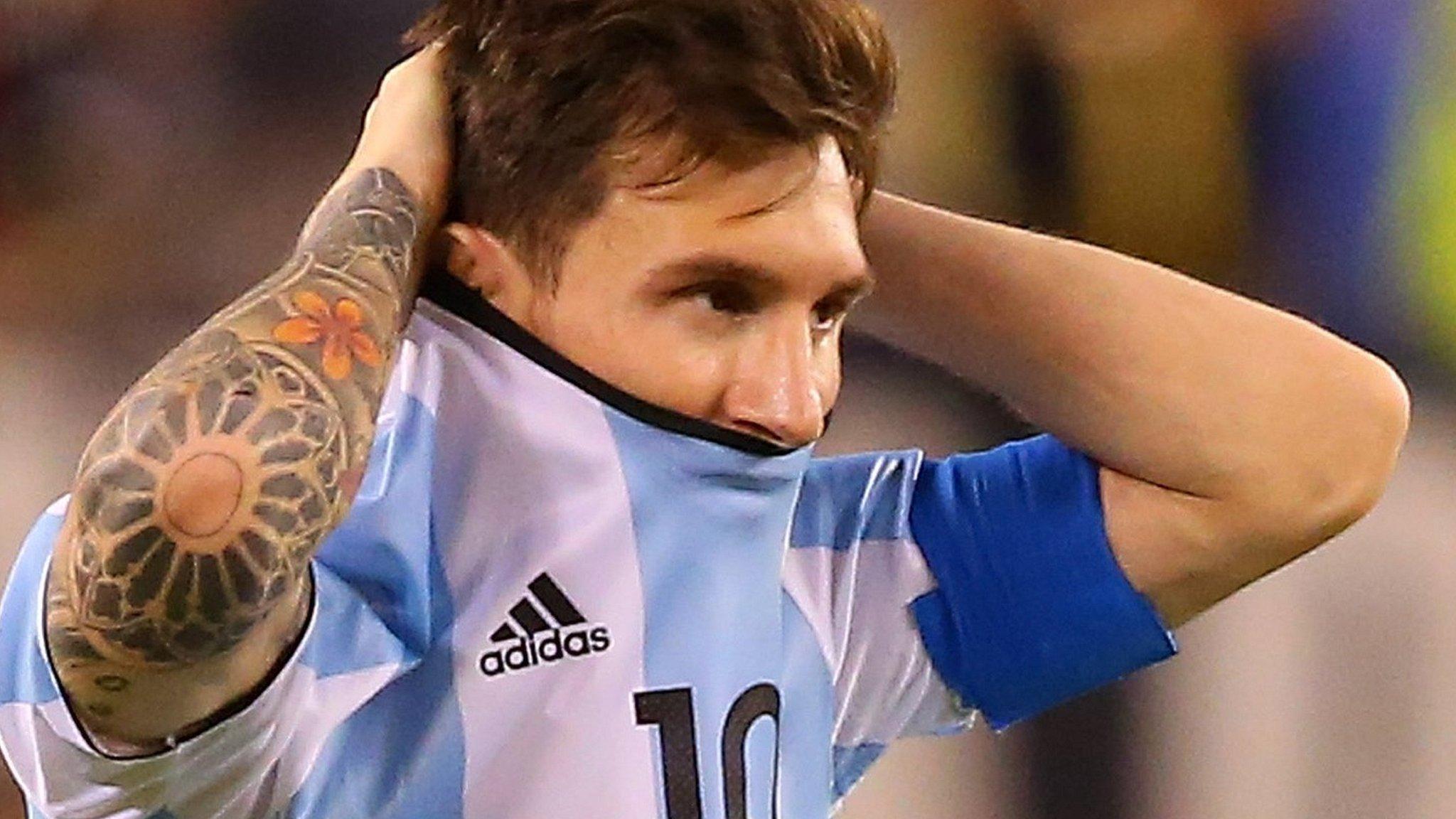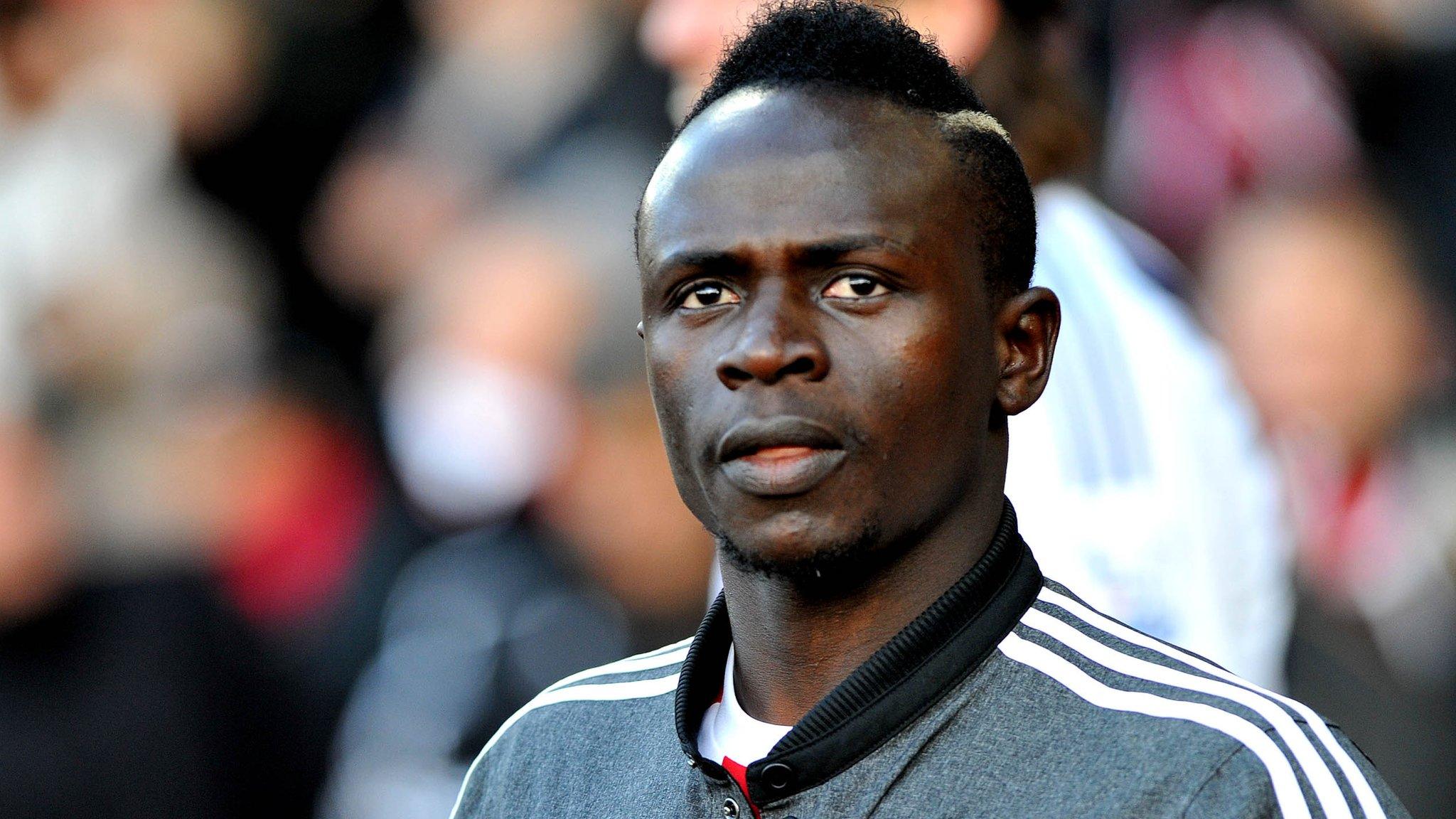Lionel Messi: How will his Argentina career be remembered?
- Published

"For me, the national team is over," said Lionel Messi after Argentina's Copa America final defeat
On Tuesday, Lionel Messi struck home a magnificent free-kick against the USA to become Argentina's all-time top scorer.
But on Sunday he sent his shootout penalty high into the New Jersey sky and Chile went on to win the Copa America title - after which Messi announced his international retirement.
It could well have been the emotion of the moment. But there is more to it than the pain of defeat.
Last week Messi voiced his discontent with the Argentine FA (AFA), calling the governing body a "disaster" after the team's travel plans were delayed. There have also been issues with hotel rooms not being ready for the players and poor facilities. It all comes against a backdrop of disarray at the AFA following the death of Julio Grondona after 35 years as chairman in 2014.
When asked about this on Friday, he said he would save his thoughts on it until after the final.
So it could well be that even in the cold light of day the 29-year-old will stand his ground. If so, if he never plays another game for Argentina, how will his career be remembered in the years to come?

Messi posted this picture on Instagram last week, writing: "Once again waiting in a plane trying to get where we're going... God, the AFA is such a disaster!"
Four times a loser
The line that Messi never reproduces his club form for his country now seems a little spurious.
Even in this tournament he has done some remarkable things. Against Panama in the group stage he came off the bench and turned a narrow 1-0 win into a 5-0 romp, scoring three and setting up another, making football look ridiculously easy.
In the quarter-final he quickly undressed a Venezuela defence that had only conceded one goal in its three group games, and he touched the heights in the semi-final against the USA, especially with that sublime free-kick.
He had his moments in the final - Chile were soon down to 10 men after holding midfielder Marcelo Diaz picked up two yellow cards, both for stopping Messi in full flight.
But always, and especially in South America, titles are what counts. Losing a final can be considered even worse than going out in the group stages; the comedown is greater because the dreams have grown bigger.
And now, for the fourth time with Argentina and for the third year in a row, Messi has been on the losing side in a final.
He had just turned 20 for the first, a 3-0 defeat by Brazil in the final of the 2007 Copa. But in the last three has been the captain, the leader, the best player in the world, the man expected to make a difference.
All three have been narrow defeats - a single goal to Germany in the 2014 World Cup final, and on penalties to Chile in the Copa in 2015 and now this year as well. All three have gone to extra time.
And yet in six hours of football, an Argentina side known for their attacking brilliance have failed to score a single goal. Messi inevitably carries the can for this.
Did Higuain's misses cost Messi?

Argentina striker Gonzalo Higuain was singled out for criticism, having missed the game's best chance. In this cartoon a man about to be shot is asked: "Any last requests?" to which he replies: "For Higuain to shoot."
Before Sunday's match Argentina football legend Diego Maradona said that the team should not bother coming home if they lose. Year in, year out, Messi has been more consistent at the highest level than Maradona was.
But Maradona starts off with a head start over Messi - he grew up among the Argentines, whereas Messi, who moved from his hometown of Rosario to Spain at the age of 13, is often accused of being a Catalan, especially when things go wrong.
Plus, Maradona has that title. He was the leader of the pack when Argentina won the World Cup in 1986. His form in the quarters and the semi-finals, against England and Belgium, was out of this world.
In the final against Germany he was marked by the mighty Lothar Matthaus, and had to play a more collective role. The Germans had hit back to 2-2, and appeared to have the momentum on their side - but Maradona produced a gorgeous through-ball, and Jorge Burruchaga raced away to slip past the keeper and win the game.
In this respect, perhaps, Maradona was luckier with his team-mates. If Burruchaga had missed, and the Germans had gone on to win the game, then maybe the star of Maradona would not shine quite so brightly in Argentina.
But where Maradona had Burruchaga, Messi has Gonzalo Higuain. A highly proficient marksman, Higuain has nevertheless been the villain of the piece in all three of the recent Argentine finals, squandering opportunities that he should have gobbled up.
This time it happened in the first half, when he robbed Gary Medel and bore down on goal. It was the clearest chance of the game, and Higuain rolled it wide. A sense of 'here we go again' descended on the Argentina players.
Perhaps Maradona would have fought that feeling with more fury, inspiring those around him to make their own destiny.
But had Higuain taken his chances, then Messi would now be swimming in international titles, and no-one would dare to doubt his place among the greatest of all time.
- Published27 June 2016

- Published27 June 2016

- Published27 June 2016

- Published27 June 2016

- Published20 June 2016

- Published7 June 2019
